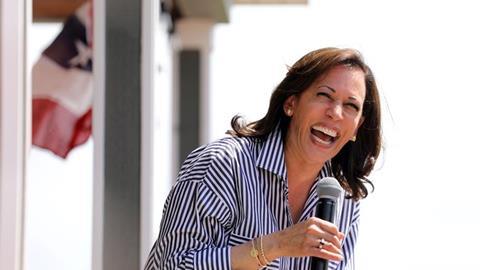As we draw closer to the US election, author Drew Cordell reflects on how Jesus treated women
It has been a turbulent couple of weeks in American politics. While we all pause to catch our collective breath, we are simultaneously getting used to the idea of Kamala Harris as the presumptive Democratic nominee for the US Presidency.
Diversity, equity and inclusion
With the recent assassination attempt and the subsequent downfall of the secret service head Kimberley Cheatle, the topic of diversity, equity and inclusion (DEI) hires has come to the forefront. There are many who argue that the symbolic benefits of such hires outweigh the potential negatives of shortcomings in competency levels.
In a similar vein to the fervent and urgent tone that Dr King enunciated in his ‘Letter from Birmingham Jail’, some believe that we are long overdue in having a female President and now is the time to immediately right this wrong.
I think it undeniable that having a female President wouldn’t just be symbolic to the American people, but it would be a beacon across the globe. A woman holding the most powerful position in the world would inevitably speak on some level to women everywhere, especially in those countries where women are treated as second class citizens.
Perhaps to the chagrin of my American brothers and sisters, we should prioritise the elevation of Kamala Harris on the basis that it would be good for men and women everywhere.
Read more:
4 reasons why Christians believe the Bible is God’s Word
Can the Bible teach us anything about depression?
Are there contradictions in the Bible?
Women and the Bible
Many believe that the Christian message and more specifically the Bible, explicitly opposes the notion of women being elevated in any way, shape or form. Such a view nearly always fails to understand the concept that the Bible is often being descriptive rather than prescriptive in articulating the behaviours of its characters.
In addition, this view also fails to interpret the biblical narratives in their cultural context, which often leads to faulty interpretations held by both Christians and non-Christians alike.
I find that taking a closer look at Jesus is always helpful at these junctures. At a DEI level, it could be argued that Jesus was an abject failure, having enlisted twelve men as his disciples. However way too many have focussed on this aspect of Jesus’ ministry and have failed to see the bigger picture at play here.
There were several women who were involved within the ministry of Jesus. We see in the Gospels several accounts of a Jesus who seems to be gradually and perhaps strategically elevating the status of women. The account of Mary of Bethany sitting under the teaching of Jesus is one key instance (Luke 10:38-42).
This all seemingly culminates in the pinnacle moment of women being the first witnesses of Jesus post resurrection, and the subsequent first communicators of the Christian gospel.
I don’t think this is an insignificant detail that some Christian teachers have taught over the years. On the contrary, I think Jesus strategically revealed his resurrection firstly to women to demonstrate that his new kingdom of which he so often spoke about, was going to be different.
No longer were women to be treated as second class citizens. They were the first witnesses and communicators of the most important game-changing event that has taken place on planet Earth. The utterances from these women’s lips have changed the world, and I would argue for the significant better.
Get access to exclusive bonus content & updates: register & sign up to the Premier Unbelievable? newsletter!
Symbolism or substantive
To speculate in closing, Jesus could have chosen some women to be formally included as his disciples, but I suspect that this would have been mostly a symbolic move, lacking anything materially substantive. It seems that Jesus was patient in waiting for the right moment to enact something of true significance and world changing for us all.
Drew Cordell is a business consultant who has worked alongside some of the world’s most successful businesses and their leaders in an extensive corporate career in both London and Australia. His new book Honest Christianity: Why People Choose to Believe is available on Amazon and all good bookstores.

























